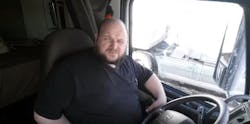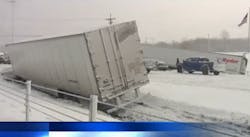Joe Graham tried to warn his fellow drivers going eastbound on I-90 near Erie, Pennsylvania about the start of a pile-up ahead of them. He screamed into his CB radio for the next 30 miles, trying to warn others about what he had seen, but only two other truckers responded as the whiteout grew denser.
In the end, the pile-up in mid-January involved 85 vehicles, including a dozen trucks. More than 18 people, including a 3-month old, were taken to hospitals with multiple injuries. The wreckage stretched for about a mile and half, and it took emergency crews –hazmat units, too – almost six hours to clear the highway.
"When I got home, I was devastated," says Graham. "What really bothered me was when I learned there were 12 trucks involved, 12 guys that I probably drove right by and tried to warn. They just didn’t heed the warning because they didn’t have their CBs on."
The day had started easy for Graham. "Road conditions were beautiful in New York, but as I got to the 32-mile marker in Pennsylvania I saw an accident [on the other side] and I knew what happened. A couple of trucks hit one of the slick spots, and the drivers did a really good job considering what they had in front of them. There were two trucks tied up, and a couple of cars and two trucks had taken evasive action to avoid the wreck. By taking the evasive action, it put them in the median. Nothing serious so far."
He thought that might have been the extent of the accident, but when he learned more about the pile-up, the incident gnawed at him. "I got on the internet later and saw what happened. It made me sick to my stomach." He had tried to help others but couldn't.
What occurred next frustrated him even more although Graham tries not to dwell on it. "The first thing you learn as a truck driver is that you've got to become thick skinned."
Graham, a driver for 12 years, who hauls water treatment chemicals for Kemira Water Solutions in Euclid, Ohio, makes videos that he uploads to Facebook and elsewhere. He's been doing it for a while and he offers his thoughts about driving and tips that might be useful to other truckers. Sometimes they're funny; sometimes serious. They're always upbeat. He was fighting back tears as he vented through the video his disappointment about calling on the CB to warn others and only two truckers responded. However, although he received many supportive comments, mainly on Facebook, many of the responses from drivers on other internet sites were unkind, mean spirited, even mocking.
Why?
Graham can't precisely articulate why his video was met with such strong negative reaction but he offers a possibility. "We have caused such a big divide [among drivers] by using terms like rookie driver or calling somebody a steering wheel holder or because a person works for a big company or whatever. We’ve caused this divide, and it’s taken good-hearted people in this industry and turned a lot of them to where they just don’t care."
He adds: "I've done a bunch of videos where I try to talk about something positive, and it’s just appalling how people have become so callous and lose sight of the importance of human life."
As for CB radio, he understands why many drivers have given up on them and why some carriers discourage their use. Many drivers instead choose to listen to satellite radio or AM talk radio especially as the normal CB discourse becomes increasingly vulgar and irrelevant. Many younger drivers toss aside CB radio as something that 'old school' drivers use. Still, Graham thinks there's a place for CBs during inclement weather. "Turn it off most of the time if you want, but use it when the weather gets bad," he says. "When things go wrong and you’re in a dire situation, you’ve got two things in your truck that are your last line of communications [to nearby drivers], your 4-ways and your CB radio. These are your last ditch effort devices to save a life or to help somebody. Do I agree with the racial comments on the CB? No. Do I think the bad language I hear is uncalled for? Absolutely. Do I think the name calling is uncalled for? Absolutely. Unfortunately it’s part of the driver culture right now."
About the Author

Larry Kahaner
Larry Kahaner is an author, journalist, and former FleetOwner contributor.

